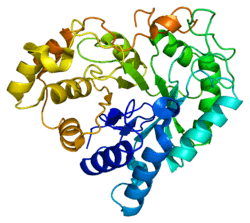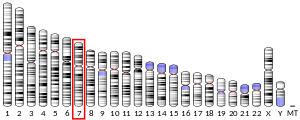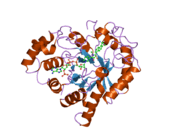AKR1B10
Aldo-keto reductase family 1 member B10 is an enzyme that in humans is encoded by the AKR1B10 gene.[5][6][7]
This gene encodes a member of the aldo/keto reductase superfamily, which consists of more than 40 known enzymes and proteins. This member can efficiently reduce aliphatic and aromatic aldehydes, and it is less active on hexoses. It is highly expressed in adrenal gland, small intestine, and colon, and may play an important role in liver carcinogenesis.[7]
References
- 1 2 3 GRCh38: Ensembl release 89: ENSG00000198074 - Ensembl, May 2017
- 1 2 3 GRCm38: Ensembl release 89: ENSMUSG00000029762 - Ensembl, May 2017
- ↑ "Human PubMed Reference:".
- ↑ "Mouse PubMed Reference:".
- ↑ Hyndman DJ, Flynn TG (Oct 1998). "Sequence and expression levels in human tissues of a new member of the aldo-keto reductase family". Biochim Biophys Acta. 1399 (2–3): 198–202. doi:10.1016/s0167-4781(98)00109-2. PMID 9765596.
- ↑ Cao D, Fan ST, Chung SS (Jun 1998). "Identification and characterization of a novel human aldose reductase-like gene". J Biol Chem. 273 (19): 11429–35. doi:10.1074/jbc.273.19.11429. PMID 9565553.
- 1 2 "Entrez Gene: AKR1B10 aldo-keto reductase family 1, member B10 (aldose reductase)".
External links
- Human AKR1B10 genome location and AKR1B10 gene details page in the UCSC Genome Browser.
- Human ARL1 genome location and ARL1 gene details page in the UCSC Genome Browser.
Further reading
- Scuric Z, Stain SC, Anderson WF, Hwang JJ (1998). "New member of aldose reductase family proteins overexpressed in human hepatocellular carcinoma". Hepatology. 27 (4): 943–50. doi:10.1002/hep.510270408. PMID 9537432.
- Strausberg RL, Feingold EA, Grouse LH, et al. (2003). "Generation and initial analysis of more than 15,000 full-length human and mouse cDNA sequences". Proc. Natl. Acad. Sci. U.S.A. 99 (26): 16899–903. doi:10.1073/pnas.242603899. PMC 139241. PMID 12477932.
- Crosas B, Hyndman DJ, Gallego O, et al. (2003). "Human aldose reductase and human small intestine aldose reductase are efficient retinal reductases: consequences for retinoid metabolism". Biochem. J. 373 (Pt 3): 973–9. doi:10.1042/BJ20021818. PMC 1223539. PMID 12732097.
- Gerhard DS, Wagner L, Feingold EA, et al. (2004). "The status, quality, and expansion of the NIH full-length cDNA project: the Mammalian Gene Collection (MGC)". Genome Res. 14 (10B): 2121–7. doi:10.1101/gr.2596504. PMC 528928. PMID 15489334.
- Petrovic MG, Peterlin B, Hawlina M, Petrovic D (2005). "Aldose reductase (AC)n gene polymorphism and susceptibility to diabetic retinopathy in Type 2 diabetes in Caucasians". J. Diabetes Complicat. 19 (2): 70–3. doi:10.1016/j.jdiacomp.2004.08.004. PMID 15745835.
- Kang ES, Kim HJ, Paek KS, et al. (2005). "Phorbol ester up-regulates aldose reductase expression in A549 cells: a potential role for aldose reductase in cell cycle modulation". Cell. Mol. Life Sci. 62 (10): 1146–55. doi:10.1007/s00018-005-5024-4. PMID 15928807.
- Lee YS, Paek KS, Kang ES, et al. (2005). "Involvement of nuclear factor kappaB in up-regulation of aldose reductase gene expression by 12-O-tetradecanoylphorbol-13-acetate in HeLa cells". Int. J. Biochem. Cell Biol. 37 (11): 2297–309. doi:10.1016/j.biocel.2005.04.016. PMID 15936242.
- Vikramadithyan RK, Hu Y, Noh HL, et al. (2005). "Human aldose reductase expression accelerates diabetic atherosclerosis in transgenic mice". J. Clin. Invest. 115 (9): 2434–43. doi:10.1172/JCI24819. PMC 1190371. PMID 16127462.
- Hazemann I, Dauvergne MT, Blakeley MP, et al. (2005). "High-resolution neutron protein crystallography with radically small crystal volumes: application of perdeuteration to human aldose reductase". Acta Crystallogr. D. 61 (Pt 10): 1413–7. doi:10.1107/S0907444905024285. PMID 16204895.
- Mashkova TD, Oparina NIu, Zinov'eva OL, et al. (2007). "[Transcription TIMP3, DAPk1 and AKR1B10 genes in squamous cell lung cancer]". Mol. Biol. (Mosk.). 40 (6): 1047–54. doi:10.1134/s0026893306060148. PMID 17209433.
- Tammali R, Ramana KV, Srivastava SK (2007). "Aldose reductase regulates TNF-alpha-induced PGE2 production in human colon cancer cells". Cancer Lett. 252 (2): 299–306. doi:10.1016/j.canlet.2007.01.001. PMC 1945127. PMID 17300864.
- Yan R, Zu X, Ma J, et al. (2007). "Aldo-keto reductase family 1 B10 gene silencing results in growth inhibition of colorectal cancer cells: Implication for cancer intervention". Int. J. Cancer. 121 (10): 2301–6. doi:10.1002/ijc.22933. PMID 17597105.
This article is issued from
Wikipedia.
The text is licensed under Creative Commons - Attribution - Sharealike.
Additional terms may apply for the media files.





